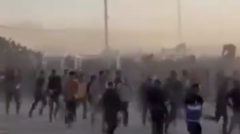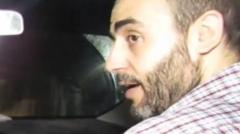Dmitriy Kurashov is accused of executing a Ukrainian soldier, reflecting the ongoing complexities and tragedies of war.
**Russian Soldier on Trial for Battlefield Execution of Ukrainian Comrade**

**Russian Soldier on Trial for Battlefield Execution of Ukrainian Comrade**
The unprecedented legal proceedings mark a significant moment in Ukraine's commitment to prosecuting war crimes.
In a groundbreaking trial in Ukraine, Russian soldier Dmitriy Kurashov, known by his callsign 'Stalker', faces serious charges for the alleged execution of Ukrainian soldier Vitalii Hodniuk, alias 'Penguin'. This case is pivotal, as it marks the first prosecution of a Russian soldier in Ukraine for a battlefield execution since the onset of the war.
The incident in question occurred in January 2024 during a fierce battle in Zaporizhzhia. Kurashov's unit, part of the notorious Storm-V detachment, executed an assault where they were initially victorious but soon lost control, leading to the capture of Kurashov and his comrades. During the skirmish, Hodniuk was reportedly shot while attempting to surrender.
Kurashov's trial is a daunting task for Ukraine's judicial system, which has no specialized war crimes court. Nonetheless, the Ukrainian authorities are determined to demonstrate accountability. The prosecution rests heavily on the testimonies of fellow Russian soldiers who have admitted to witnessing the execution, despite potential biases stemming from their circumstances as prisoners of war.
This trial brings to light the broader scale of war crimes being investigated against Russian forces. According to Ukraine, there have been multiple incidents of executions committed by their adversaries, leading to thousands of ongoing investigations. The United Nations has raised concerns over a documented increase in such violations, emphasizing the need for justice and accountability.
Kurashov now faces a long time behind bars in Ukrainian prison if convicted, as the prosecuting authorities are committed to delivering justice for the families of war crime victims. The trial continues to unfold, shedding light on the complexities and moral dilemmas faced during the conflict, as both sides grapple with the brutal realities of war.
The incident in question occurred in January 2024 during a fierce battle in Zaporizhzhia. Kurashov's unit, part of the notorious Storm-V detachment, executed an assault where they were initially victorious but soon lost control, leading to the capture of Kurashov and his comrades. During the skirmish, Hodniuk was reportedly shot while attempting to surrender.
Kurashov's trial is a daunting task for Ukraine's judicial system, which has no specialized war crimes court. Nonetheless, the Ukrainian authorities are determined to demonstrate accountability. The prosecution rests heavily on the testimonies of fellow Russian soldiers who have admitted to witnessing the execution, despite potential biases stemming from their circumstances as prisoners of war.
This trial brings to light the broader scale of war crimes being investigated against Russian forces. According to Ukraine, there have been multiple incidents of executions committed by their adversaries, leading to thousands of ongoing investigations. The United Nations has raised concerns over a documented increase in such violations, emphasizing the need for justice and accountability.
Kurashov now faces a long time behind bars in Ukrainian prison if convicted, as the prosecuting authorities are committed to delivering justice for the families of war crime victims. The trial continues to unfold, shedding light on the complexities and moral dilemmas faced during the conflict, as both sides grapple with the brutal realities of war.

















